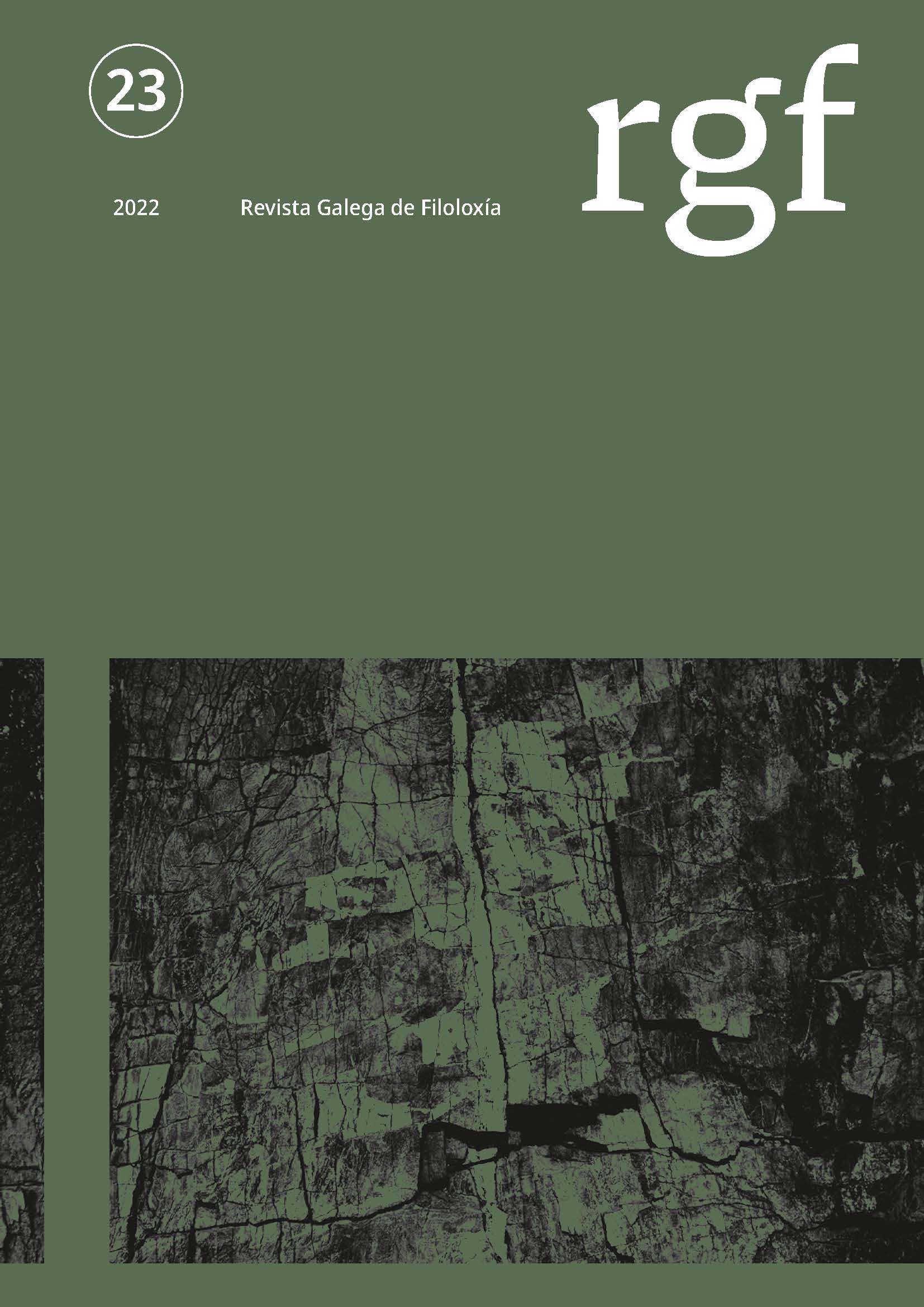Taking Buzzfeed to Literature classes: lists and literary canon for linguistic and cultural mediation in the context of Portuguese as a Foreign Language
Main Article Content
Abstract
The recurrent disinterest of our PFL students in literature has led us towards a teaching practice that tries to maintain the essence of the subject, but also to renew the approach from which to work. Based on the belief that the literary text is part of the cultural memory of a specific collective, we consider that one of the ways to make the subject relevant lies in the transmission of the meaning that the canon assumed and still assumes in the Portuguese cultural imaginary, constituting. Therefore, literature appears as a piece of essential knowledge for a student of PFL conceived as a social actor capable of interculturally mediating between languages. The inscription of the canon in the collective memory constitutes a first approach which, we think, is now not only useful, but also confirmed in the light of the development of mediation and the pluricultural competence and, of the new theories on postliterary practices.
Keywords:
Downloads
Metrics
Article Details
References
Bayard, Pierre (2007). Comment parler des livres que l’on n’a pas lus? Paris: Éditions de Minuit.
Beacco, Jean-Claude, Byram, Michael, Cavalli, Marisa, Coste, Daniel, Cuenat, Mirjam Egli, Goullier, Francis, & Panthier, Johanna (2016). Guide for the development and implementation of curricula for plurilingual and intercultural education. Estrasburgo: Council of Europe Publishing.
Bernardes, José Cardoso (2011). “Os estudos literários na universidade”. Em Silva, João Amadeu, Martins, Cândido Oliveira, Gonçalves, Miguel (orgs.), Pensar a Liter@tura no século XXI, 27-52. Braga: Publicações da Faculdade de Filosofia & Universidade Católica Portuguesa.
Bernardes, José Cardoso, & Mateus, Rui Afonso (2013). Literatura e ensino de português. Lisboa: Fundação Francisco Manuel dos Santos.
Billig, Michael (1995). Banal Nationalism. London: SAGE.
Buescu, Helena Carvalhão (2013). “Literatura, cânone e ensino”. Em Buescu, Helena Carvalhão, Experiência do Incomum e Boa Vizinhança. Literatura Comparada e Literatura-Mundo, 140-165. Porto: Porto Editora.
Calvino, Italo (1995). Perché leggere i classici. Em Calvino, Italo, Saggi (1945-1985). A cura de Mario Barenghi, 1816-1824. Milano: Arnoldo Mondadori Editore.
Candelier, Michel, Camilleri-Grima, Antoinette, Castellotti, Véronique, de Pietro, Jean-François, Lőrincz, Ildikó, Meißner, Franz-Joseph, Noguerol, Artur, & Schröder-Sura, Anna (2012). Framework of Reference for Pluralistic Approaches to Languages and Cultures. Estrasburgo: Council of Europe Publishing.
Conselho da Europa (2001). Quadro Europeu Comum de Referência para as Línguas. Lisboa: Edições ASA. Disponível em: https://www.dge.mec.pt/sites/default/files/Basico/Documentos/quadro_europeu_comum_referencia.pdf (Consultado em 31.05.2022).
Council of Europe (2020). Common European Framework of Reference for Languages: Learning, teaching, assessment - Companion volume. Estrasburgo: Council of Europe Publishing. Disponível em: www.coe.int/lang-cefr (Consultado em 31.05.2022).
Coste, Daniel, Moore, Danièle, & Zarate, Geneviève (2009). Plurilingual and pluricultural competence. Estrasburgo: Language Policy Division, Council of Europe.
Eco, Umberto (2016). Il vertigine della lista. Milão: Bompiani.
Feijó, António M., Figueiredo, João R. & Tamen, Miguel (2021). O cânone. Lisboa: Fundação Cupertino de Miranda & Edições Tinta da China.
Gefen, Alexandre (2021). L’Idée de littérature. De l’art pour l’art aux écritures d’intervention. Paris: Corti.
Gusmão, Manuel (2011). Uma razão dialógica. Ensaios sobre literatura, a sua experiência do humano e a sua teoria. Lisboa: Edições Avante.
Kramsch, Claire J. (2006). “From Communicative Competence to Symbolic Competence”, The Modern Language Journal, 90/2, 249-252.
Kramsch, Claire J., & Kramsch, Olivier (2000). “The Avatars of Literature in Language Study”. The Modern Language Journal, 84/4, 553-573.
Lisboa, Eugénio (2021). Vamos ler. Um cânone para o leitor relutante. Lisboa: Guerra & Paz.
Lucas, Margarida, & Moreira, António (2018). DigCompEdu: quadro europeu de competência digital para educadores. Aveiro: Universidade de Aveiro. Disponível em: https://erte.dge.mec.pt/noticias/digcompedu-quadro-europeu-de-competencia-digital-para-educadores
Ludmer, Josefina (2010). Aquí América Latina. Una especulación (Latin America Speaking. Speculations). Buenos Aires: Eterna Cadencia Editora.
Maingueneau, Dominique (2006). Contre Saint-Proust ou la fin de la Littérature. Paris: Belin.
Ogando González, Iolanda (2019). “A literatura nas aulas de PLE para aprender e comunicar sobre a memoria cultural portuguesa”, Diacrítica, 32/2, 211-237. Disponível em https://doi.org/10.21814/diacritica.438 (Consultado em 31.05.2022).
Parkinson, Brian, & Reid Thomas, Helen (2000). Teaching Literature in a Second Language. Edinburgh: Edinburgh University Press.
Pelletier, Kathe et al. (2022). 2022 Educause Horizon Report, Teaching and Learning Edition. Boulder, CO: Educause. Disponível em https://library.educause.edu/resources/2022/4/2022-educause-horizon-report-teaching-and-learning-edition (Consultado em 31.05.2022).
Poole, Steven (2013). “Top nine things you need to know about ‘listicles’”. The Guardian (12 novembro). Disponível em https://www.theguardian.com/books/2013/nov/12/listicles-articles-written-lists-steven-poole (Consultado em 31.05.2022).
Rita, Annabela (2014). Luz & Sombras do Cânone Literário. Lisboa: Esfera do Caos.
Rita, Annabela (2018). Do que não existe. Repensando o cânone literário. Lisboa: Manufactura.
Rita, Annabela (2019). Perfis & Molduras no Cânone Literário. Lisboa: Edições Esgotadas.
Rita, Annabela (2021). Sfumato & Cânone Literário. Na senda da identidade nacional. Lisboa: Ediçoes Esgotadas.
Santos Unamuno, Enrique (2018). “La literatura como patrimonio: del nation building al nation branding”, Tropelías. Revista de Teoría de la Literatura y Literatura Comparada, 4, 116-137. Disponível em https://doi.org/10.26754/ojs_tropelias/tropelias.201843067 (Consultado em 31.05.2022).
Santos Unamuno, Enrique (2022a). (Post)Literature and the Canon in an Age of Branding. [No prelo]
Santos Unamuno, Enrique (2022b). “Unamuno entre nation building y nation branding”. Disponível em: https://www.youtube.com/watch?v=kfl0mj0qkXk (consultado em 31.05.2022).
Sousa, Rodrigo (2015). Os escritores mais fixes de Portugal. Lisboa: Alêtheia Editores.
Vuorikari, Riina, Kluzer, Stefano, & Punie, Yves (2022). The Digital Competence Framework for Citizens with eight proficiency levels and examples of use (DIGCOMP 2.2.). Disponível em: https://publications.jrc.ec.europa.eu/repository/bitstream/JRC128415/JRC128415_01.pdf (Consultado em 31.05.2022).
Young, Liam Cole (2017). List Cultures. Knowledge and Poetics from Mesopotamia to Buzzfeed. Amsterdam: Amsterdam University Press. Disponível em https://doi.org/10.5117/9789462981102



